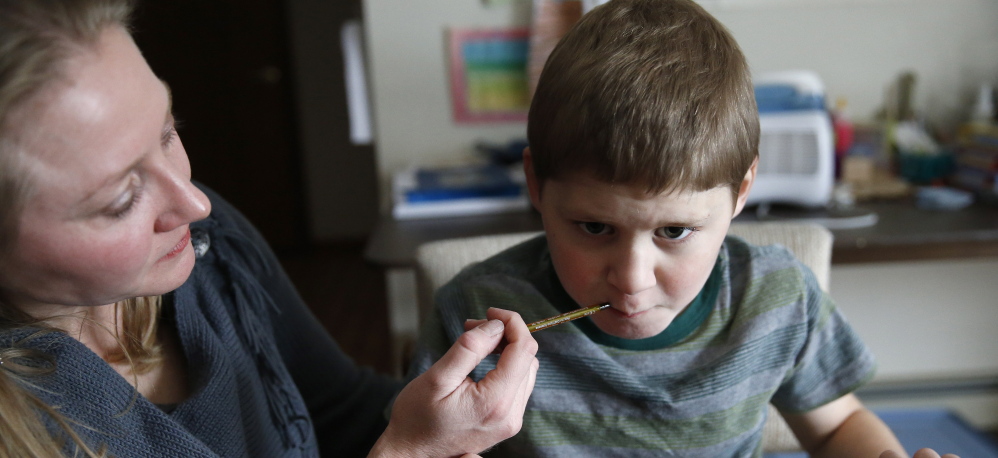The parent of a sick child would do anything to find a medication that would restore the youngster to good health. But when the treatment in question is medical marijuana, parents quickly run up against one of the drug’s major shortcomings: Because cannabis has been categorized as a substance more dangerous than cocaine, lacking any “currently acceptable medical use,” there’s been virtually no research into whether it’s safe or effective for use in children.
Now the nation’s leading group of pediatricians is looking to change this situation. The American Academy of Pediatrics is pushing the federal government to reclassify cannabis so experts can do more investigation into how and whether it can help children – a move that could ultimately improve the well-being of tens of thousands of kids across the United States.
Of all the disorders that could be treated by medical cannabis, epilepsy is one of the more high-profile. (The Epilepsy Foundation called on the U.S. Drug Enforcement Administration to reclassify medical cannabis last year.) In Maine and the 22 other states where cannabis is legal for medicinal uses, the substance (taken in a liquid form, in food or under the tongue) has become something of a miracle drug for parents of the estimated 100,000 children in the U.S. who experience frequent and uncontrollable seizures.
Each seizure turns the brain off for a moment. Having hundreds of seizures weekly or even daily, as some youngsters do, can cause memory defects, attention deficits and difficulty with finding and remembering words, as well as behavior and social issues. And the negatives of untreatable epilepsy continue into adulthood: “The focus of trouble simply shifts from school to the workplace,” according to Canadian epilepsy researcher W. McIntyre Burnham.
But the evidence in favor of medical cannabis for childhood disorders is largely word-of-mouth. There’s relatively little hard proof that cannabis is an effective medication. To test medical cannabis in an independent clinical trial involving human subjects, a researcher must get the approval of three different federal agencies. That’s because cannabis is a Schedule 1 drug: a substance as dangerous as heroin and LSD.
Now the American Academy of Pediatrics, citing the “limited evidence” that medical cannabis may ease some conditions in adults, wants to enable research in children by making cannabis a Schedule 2 drug. Substances on this list, like morphine and codeine, have “a high potential for abuse” but can be used for medical purposes and may be prescribed by a doctor.
The pediatricians’ group has never before called for cannabis to be reclassified, so this is both a major shift and a wise one. Currently, parents don’t know whether the medical cannabis they’ve bought is actually safe or potent unless they get it tested in a third-party lab. And if they can’t find something that works at home, they don’t have the option of shopping in another state – under federal law, that’s drug trafficking.
Allowing scientists to document medical cannabis’ therapeutic benefits and drawbacks in clinical studies could pave the way for the development of standardized, effective, readily available medications for a disorder that affects tens of thousands of kids when they’re at a vulnerable point developmentally.
Hundreds of thousands of adults also stand to benefit. Of the 2.3 million Americans over 18 with epilepsy, one-third have a drug-resistant type, making it harder for them to find and keep a job than their peers in the general population and more likely to be socially withdrawn and to die by suicide.
The Food and Drug Administration, which can recommend whether to reclassify a drug, is already reviewing whether cannabis should remain on the list of Schedule 1 substances. If the federal government truly wants American families to be happy and healthy, the recommendation of the American Academy of Pediatrics – an organization grounded in knowledge of children’s health and advocacy for children’s well-being – should count for a great deal.
Send questions/comments to the editors.



Success. Please wait for the page to reload. If the page does not reload within 5 seconds, please refresh the page.
Enter your email and password to access comments.
Hi, to comment on stories you must . This profile is in addition to your subscription and website login.
Already have a commenting profile? .
Invalid username/password.
Please check your email to confirm and complete your registration.
Only subscribers are eligible to post comments. Please subscribe or login first for digital access. Here’s why.
Use the form below to reset your password. When you've submitted your account email, we will send an email with a reset code.